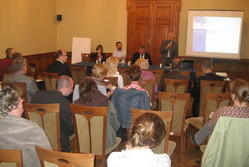Cycling and Walking Workshop in Poland’s secret capital (CIVITAS CATALIST)

Rupprecht Consult GmbH and the City of Kraków organised a Workshop on “Cycling and Walking” in Poland’s secret capital Krakow. The event on 23-24 June was targeted at Polish cities wanting to learn about the CIVITAS Initiative and its cycling and walking measures.
The Workshop was widely promoted in Poland. Representatives of cities from all across the country participated, including the five largest cities of Warsaw, Kraków, Łódź, Wrocław, and Poznań, but also smaller cities such as Elbląg, Gliwice, Kalisz, Kielce or Murowana Goślina, which view cycling and walking as an integral part of their urban mobility planning. Generally speaking, the modal share of cycling is low in Polish cities - at least in comparison with many Northern and Western European countries where a share of more than 20% of all urban transport trips is often achieved (e.g. in Denmark, the Netherlands and some German cities). In Kraków, one of the most advanced Polish cities in terms of implementing innovative sustainable mobility solutions, the modal share of cycling is only 2-4%. Workshop participants were eager to learn about the measures implemented in Bremen, Ljubljana, Rotterdam, Oslo, Venice, and of course Kraków itself. The case of Kraków in particular raised many curious questions from the Polish participants during the technical site visit at which the Bicycle renting System “BikeOne” was explained by the Operator and representatives of the City of Kraków.The Cycling and Walking Workshop in Kraków was an event of CIVITAS CATALIST. This project carries out long-term evaluations of former CIVITAS measures and it furthermore aims to exploit and promote the experiences gained in previous CIVITAS projects. In order to combine the long-term evaluation and the exploitation aspects of CIVITAS CATALIST, the workshop was organised as a two-day Reflection and Promotion Workshop, which proved to be a successful event and will serve as a positive example to build upon in future workshops with a different theme and in other CIVITAS CATALIST partner cities.The Workshop had the aim and ambition to develop recommendations of practical relevance for future implementers. A set of (draft) recommendations was jointly elaborated by all workshop participants:Communicate the benefits of cycling well, in particular in terms of energy efficiency, pollution and CO2 reduction, time saving, costs, urban space, and healthA cycling coordinator is good, requires strong political support as well as a dedicated budgetMuch can be learned from other cities (politicians; staff; visits instead of staff exchange)Cycling plan <=> urban plan: a cycling plan is necessary, provides statusWalking needs different attention (pedestrian areas in the city centre)Symbol politics important: Be able to show “highlights” (bridge, campaign, lanes); involve sportsmen and other prominent figures for promotion and awareness raisingIf use of the car is (too) high: Consider parking policy, and/or access management measuresStakeholder involvement: important for all measures; can be done in workshops/seminars; many different groups to be involved; can act as multipliers. However, handle stakeholder involvement with care, make sure opinions are “in balance”Monitoring / data is needed; comprehensive counting is good, but not enough; surveys are also needed; use the same method over timeInvest, if possible, in a combination of infrastructure measures (bicycle lanes, bicycle parking, street markings, etc.) and awareness, promotion, and communication campaign(s); keep in mind that good infrastructure investments in cycling can be low-costNot all infrastructure needs to be perfectly right from the start: where enough space is available, painted cycling paths on the pavement can be an effective temporary measure.Please find here to download:AgendaWorkshop presentations






